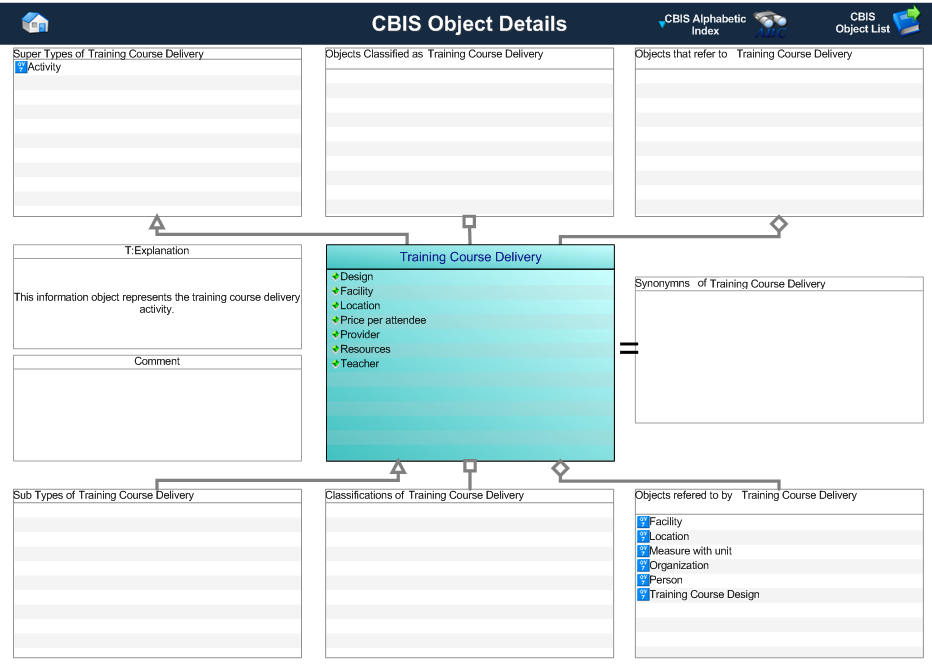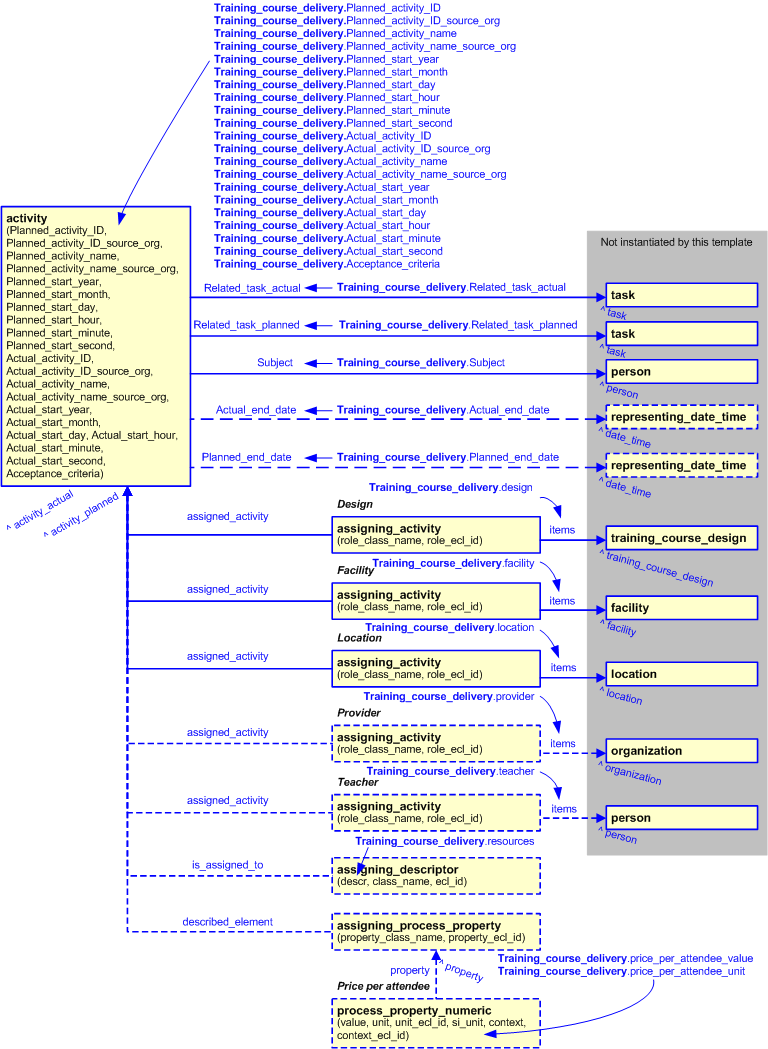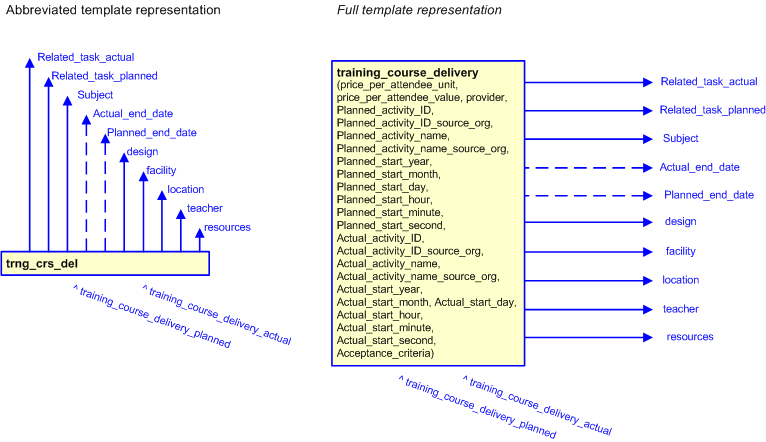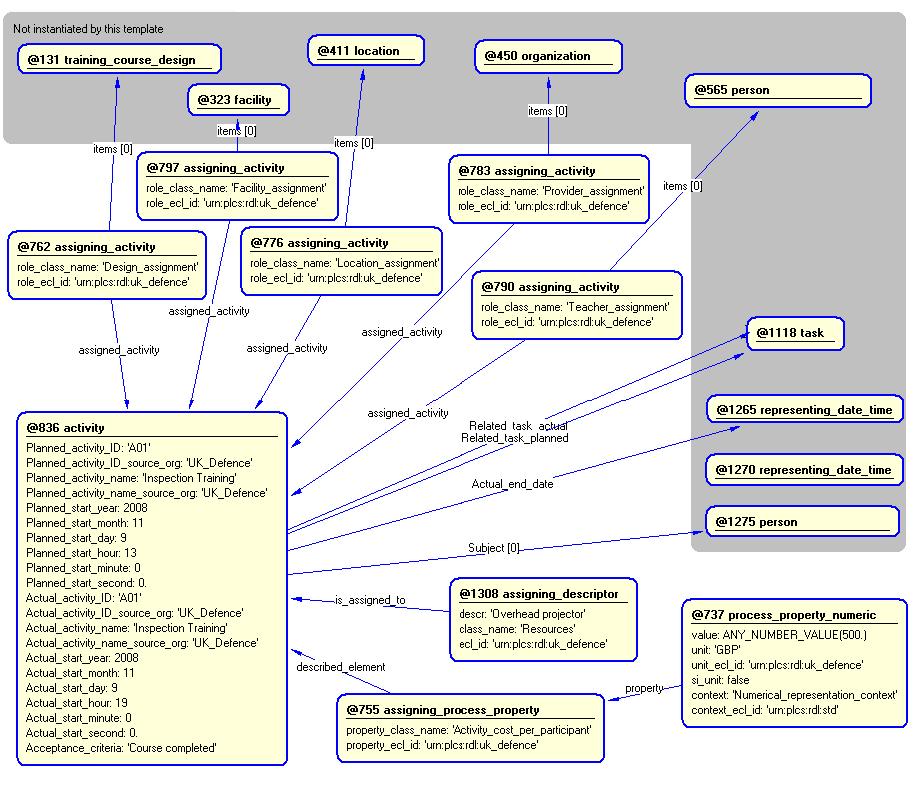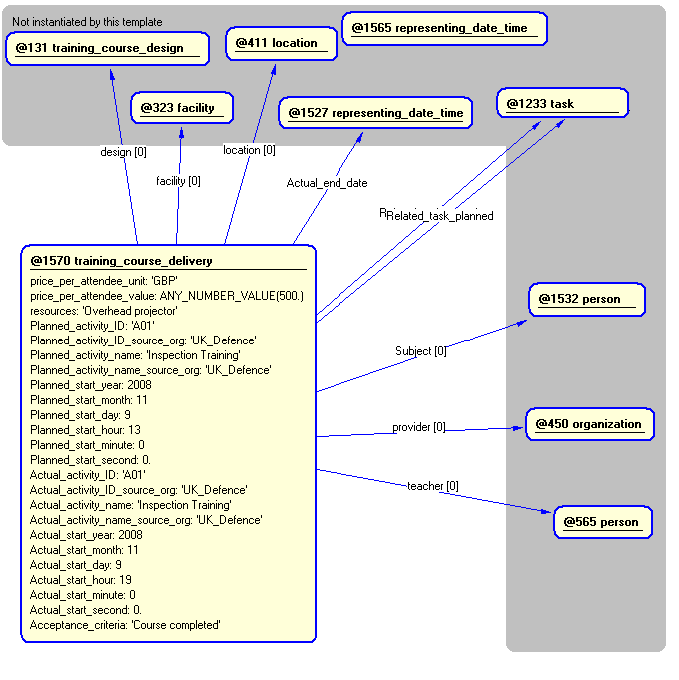Template:— training_course_delivery (trng_crs_del)
Context:— UK_Defence |
Date: 2010/03/12 11:41:49
Revision: 1.6
|
This section specifies the template training_course_delivery.
NOTE
The template has been defined in the context of
UK_Defence.
Refer to the business context for details of related templates.
NOTE
An explanation of a template and the associated instantiation path is
provided in the
Template overview
section.
This template describes how to represent the training course delivery activity.
This information object represents the training course delivery activity.
Figure 1 — Graphical Representation for Business Object Training Course Delivery
Training Course Delivery:
|
Attribute name
|
Attribute description
|
Attribute type
|
Optionality
|
| Design |
This is the reference to the training course design |
Relationship to Training Course Design |
Mandatory |
| Facility |
This is the reference to the facility in which the training course was delivered |
Relationship to Facility |
Mandatory |
| Location |
This is the reference to the location of the training activity |
Relationship to Location |
Mandatory |
| Price per attendee |
This is the price charged for the training course per attendee |
Intrinsic |
Optional |
| Provider |
This is the reference to the organization providing the training course. |
Relationship to Organization |
Optional |
| Resources |
This is a description of the resources used for the training couse. |
Intrinsic |
Optional |
| Teacher |
This is the reference the person delivering the training course. |
Relationship to Person |
Optional |
Table 1 — Training Course Delivery attribute details
The EXPRESS-G diagram in
Figure
2
shows the templates and EXPRESS entities that are required
to represent the template
"training_course_delivery".
The text highlighted in blue shows the template parameters.
Figure 2 — An EXPRESS-G representation of the Information model for training_course_delivery
The graphic for the template to be used in other EXPRESS-G diagrams
is shown in Figure
3
below.
Figure 3 — The graphical representation of the training_course_delivery template
The following input parameters are defined for this template:
This is the reference to the training course design.
This is the reference to the facility in which the training course was delivered.
This is the reference to the location of the training activity.
The class name corresponding to the unit in which the usage value is measured.
The following classes and their sub-classes can be used:
The value of the price charged for the training course per attendee.
The data type must also be indicated in this parameter, e.g.
"ANY_NUMBER_VALUE(5)".
This is the reference to the organization providing the training course.
This is a description of the resources used for the training course.
This is the reference to the person delivering the training course.
The identifier of the training course delivery.
The identifier of the organization that is the source of the identifier of the training course delivery.
The name of the training course delivery.
The identifier of the organization that is the source of the name.
The year component of the date and time the training course delivery is planned to start.
The month component of the date and time the training course delivery is planned to start.
The day component of the date and time the training course delivery is planned to start.
The hour component of the date and time the training course delivery is planned to start.
The minute component of the date and time the training course delivery is planned to start.
This parameter is optional. If not given, it will remain unset.
The second component of the date and time the training course delivery is planned to start.
This parameter is optional. If not given, it will remain unset.
The task that defines the training course delivery.
The identifier of the training course delivery.
The identifier of the organization that is the source of the identifier.
The name of the training course delivery.
The identifier of the organization that is the source of the name.
The year component of the date and time the training course delivery was started.
The month component of the date and time the training course delivery was started.
The day component of the date and time the training course delivery was started.
The hour component of the date and time the training course delivery was started.
The minute component of the date and time the training course delivery was started.
This parameter is optional. If not given, it will remain unset.
The second component of the date and time the training course delivery was completed.
This parameter is optional. If not given, it will remain unset.
The acceptance criterion for the training course delivery.
The date on which the training course delivery is actually completed.
The date by which the training course delivery is intended to be finished.
The actual task that defines the training course delivery.
The recipient of the training course.
The following reference parameters are defined for this template:
Allow the
Activity
entity instantiated in this path to be referenced when this template is used.
Note: The
Activity
entity can be referenced in a template path by:
%^target = $training_course_delivery.training_course_delivery_planned%
where
target
is the parameter to which the
Activity
is bound.
Allow the
Activity_actual
entity instantiated in this path to be referenced when this template is used.
%^target = $training_course_delivery.training_course_delivery_actual%
The following parameter combinations specify a uniqueness constraint:
Unique constraint: Training_course_delivery_actual
Unique constraint: Training_course_delivery_planned
The instantiation path shown below specifies the entities that are to be
instantiated by the template.
A description of templates and the syntax for the instantiation path is
provided in the
Templates Help/Information section.
/
activity(
Planned_activity_ID=@Planned_activity_ID,
Planned_activity_ID_source_org=@Planned_activity_ID_source_org,
Planned_activity_name=@Planned_activity_name,
Planned_activity_name_source_org=@Planned_activity_name_source_org,
Planned_start_year=@Planned_start_year,
Planned_start_month=@Planned_start_month,
Planned_start_day=@Planned_start_day,
Planned_start_hour=@Planned_start_hour,
Planned_start_minute=@Planned_start_minute,
Planned_start_second=@Planned_start_second,
Planned_end_date=@Planned_end_date,
Related_task_planned=@Related_task_planned,
Actual_activity_ID=@Actual_activity_ID,
Actual_activity_ID_source_org=@Actual_activity_ID_source_org,
Actual_activity_name=@Actual_activity_name,
Actual_activity_name_source_org=@Actual_activity_name_source_org,
Actual_start_year=@Actual_start_year,
Actual_start_month=@Actual_start_month,
Actual_start_day=@Actual_start_day,
Actual_start_hour=@Actual_start_hour,
Actual_start_minute=@Actual_start_minute,
Actual_start_second=@Actual_start_second,
Actual_end_date=@Actual_end_date,
Related_task_actual=@Related_task_actual,
Subject=@Subject,
Acceptance_criteria=@Acceptance_criteria)/
%^training_course_delivery_planned = $activity.activity_planned%
%^training_course_delivery = $activity.activity_actual%
-- Design /
assigning_activity(
role_class_name='Design_assignment',
role_ecl_id='urn:plcs:rdl:uk_defence',
assigned_activity=^training_course_delivery,
items=@design)/
-- Facility /
assigning_activity(
role_class_name='Facility_assignment',
role_ecl_id='urn:plcs:rdl:uk_defence',
assigned_activity=^training_course_delivery,
items=@facility)/
-- Location /
assigning_activity(
role_class_name='Location_assignment',
role_ecl_id='urn:plcs:rdl:uk_defence',
assigned_activity=^training_course_delivery,
items=@location)/
-- [optional Provider] /
assigning_activity(
role_class_name='Provider_assignment',
role_ecl_id='urn:plcs:rdl:uk_defence',
assigned_activity=^training_course_delivery,
items=@provider)/
-- [optional Teacher] /
assigning_activity(
role_class_name='Teacher_assignment',
role_ecl_id='urn:plcs:rdl:uk_defence',
assigned_activity=^training_course_delivery,
items=@teacher)/
-- [optional Resources] /
assigning_descriptor(
descr=@resources,
class_name='Resources',
ecl_id='urn:plcs:rdl:uk_defence')/
-- Assigning_process_property /
assigning_process_property(
property_class_name='Activity_cost_per_participant',
property_ecl_id='urn:plcs:rdl:uk_defence',
described_element=^training_course_delivery)/
%^price_param = $assigning_process_property.property%
-- value and unit /
process_property_numeric(
value=@price_per_attendee_value,
unit=@price_per_attendee_unit,
unit_ecl_id='urn:plcs:rdl:uk_defence',
si_unit='false',
context='Numerical_representation_context',
context_ecl_id='urn:plcs:rdl:std',
property=^price_param)/
The instance diagram in Figure
4
shows an example of the EXPRESS entities and templates that are instantiated by the template:
/training_course_delivery(design='@131', facility='@323', location='@411', Actual_end_date='@1527', Planned_end_date='@1565', Related_task_planned='@1233', Related_task_actual='@1233', Subject='@1532', provider='@450', teacher='@565', price_per_attendee_unit='GBP', price_per_attendee_value='ANY_NUMBER_VALUE(500.)', resources='Overhead projector', Planned_activity_ID='A01', Planned_activity_ID_source_org='UK_Defence', Planned_activity_name='Inspection Training', Planned_activity_name_source_org='UK_Defence', Planned_start_year='2008', Planned_start_month='11', Planned_start_day='9', Planned_start_hour='13', Planned_start_minute='0', Planned_start_second='0', Actual_activity_ID='A01', Actual_activity_ID_source_org='UK_Defence', Actual_activity_name='Inspection Training', Actual_activity_name_source_org='UK_Defence', Actual_start_year='2008', Actual_start_month='11', Actual_start_day='9', Actual_start_hour='19', Actual_start_minute='0', Actual_start_second='0', Acceptance_criteria='Course completed')/
(an illustration of the consolidated training_course_delivery template is shown in
Figure
5 below.)
Figure 4 — Entities instantiated by training_course_delivery template
The instance diagram in
Figure
5
shows the graphic symbol for the template that is to be
used in other instance diagrams. The example template is:
/training_course_delivery(design='@131', facility='@323', location='@411', Actual_end_date='@1527', Planned_end_date='@1565', Related_task_planned='@1233', Related_task_actual='@1233', Subject='@1532', provider='@450', teacher='@565', price_per_attendee_unit='GBP', price_per_attendee_value='ANY_NUMBER_VALUE(500.)', resources='Overhead projector', Planned_activity_ID='A01', Planned_activity_ID_source_org='UK_Defence', Planned_activity_name='Inspection Training', Planned_activity_name_source_org='UK_Defence', Planned_start_year='2008', Planned_start_month='11', Planned_start_day='9', Planned_start_hour='13', Planned_start_minute='0', Planned_start_second='0', Actual_activity_ID='A01', Actual_activity_ID_source_org='UK_Defence', Actual_activity_name='Inspection Training', Actual_activity_name_source_org='UK_Defence', Actual_start_year='2008', Actual_start_month='11', Actual_start_day='9', Actual_start_hour='19', Actual_start_minute='0', Actual_start_second='0', Acceptance_criteria='Course completed')/
Figure 5 — Instantiation of training_course_delivery template
Characterizations
No common characterizations of the template
training_course_delivery
have been identified. However, the ISO 10303-239 EXPRESS model
may enable other assignments to the entities instantiated by the template.
